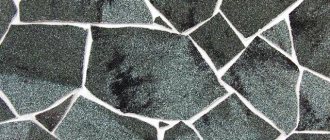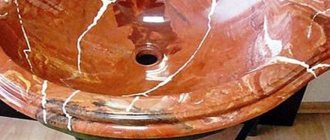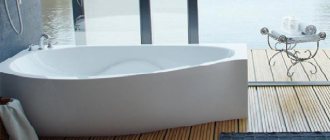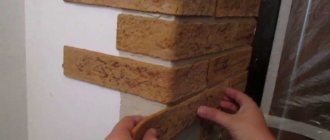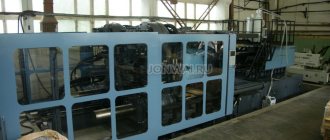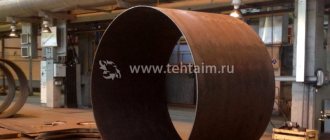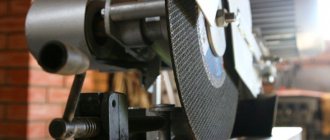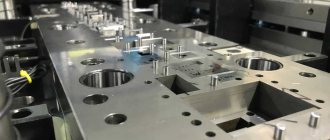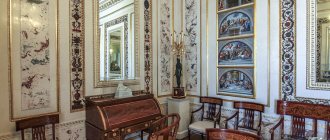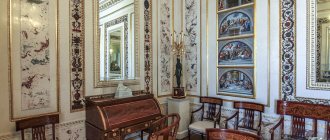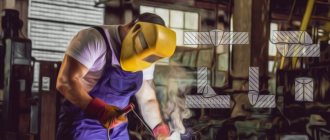With the advent of artificial marble, middle-income consumers have the opportunity to furnish their homes with a beautiful, cheap and reliable imitation stone. In Russia, over the past 10-12 years, the demand for this product has been growing more and more rapidly. There are many manufacturers and types of non-natural stone on the market, but the demand for it is still not fully covered.
What are the benefits of producing artificial marble, how to open your own factory, is it possible to organize production at home - our article will answer all these questions.
1. Relevance of the business and target audience 2. Types of material 3. Artificial marble - manufacturing technology 4. What is needed to open a small factory? 5. Documentation 6. Equipment 7. Premises 8. Personnel 9. Is it possible to conduct business at home? 10. Financial plan: calculations of profitability and payback
Business relevance and target audience
Artificial marble is a material that imitates natural stone in properties and appearance. The advantages of imitation over real marble are low price and wider scope of application.
With the advent of a substitute for natural stone, interior and exterior design has reached a new level. The material is easy to install, easy to maintain and has excellent performance qualities.
Artificial marble is used in interior and exterior decoration, and in landscape design. In many ways it even surpasses the original. The stone is reliable, strong and durable, lightweight, able to regulate humidity and transfer heat, and does not deform. It can be covered with unusual patterns.
The demand for the material is constantly growing, and the market itself is far from being filled. In Russia, inexpensive and beautiful stone is in demand.
Use of marble
Marble has been known to mankind as a construction and finishing material since ancient times. Even in Ancient Greece, craftsmen knew how to process this stone, and used it for the construction and decoration of palaces, temple buildings and technical structures. At the same time, famous antique sculptures appeared, the material for which was plastic and easy to process marble. Ancient statues still delight viewers with their expressiveness, minute detail and mastery of execution.
Due to the fact that stone has a low moisture absorption coefficient, it is widely used in finishing rooms with high humidity. Marble tiles and mosaics are used for lining pool bowls, fountains, and also for finishing rooms with high humidity. Good heat resistance, environmental safety and impeccable decorative qualities make marble an ideal finishing material. Marble is widely used in interiors.
Types of material
Artificial marble is divided according to production technology. The stone is distinguished:
- Liteva. After preparation, the composition is poured into prepared matrix forms. Needed to create countertops.
- Oselkovy (gypsum). The base is gypsum, into which water and other fillers are poured. It is light in weight and regulates indoor humidity.
- Ground (chopped). The raw material for production is natural marble in powdered (crushed) form. The stone is resistant to solar radiation, precipitation, and wind.
- Liquid (flexible). The main ingredient is marble chips with acrylic fillers. Needed for finishing, pasting interior parts, very flexible (can be cut with a knife).
- Concrete marble. This is a subtype of cast artificial stone; it is made from artificial materials.
Production of artificial stone: how to choose resin for casting?
Today, the composite market offers a huge variety of polyester resins for filled casting. How to make high-quality artificial stone, choose a suitable resin and what resins for casting artificial stone can be bought at NGK-market?
Let's take a look at some of the casting resin options in our range and the technologies for which these resins are best suited.
Basic technologies for manufacturing artificial stone
To begin with, we suggest that you briefly consider what artificial stone casting technologies exist, what products they allow to obtain as a result, and what difficulties may arise during the production process.
Artificial granite
By artificial granite we mean all the many options for producing artificial stone using various brands of filler, popularly known as “chips”. Our assortment includes the PolyStone collection from the American company ASC International and Russian Radochips from the Raduga-Sintez company, as well as Granistone from the manufacturer of the same name.
Artificial granite production technologies are divided into two types: Spray Granite
and
Solid Surface
. The first involves spraying a decorative layer consisting of gelcoat and chips, and then filling the internal space with casting resin in combination with microcalcite or other inexpensive mineral. In this case, the requirements for the characteristics of the resin are minimal.
The second involves casting a mixture of resin, chips and aluminum trihydrate without using gelcoat. Here, the requirements for casting resin increase sharply along with the cost of the product. Depending on the type of product, the resin must have certain characteristics, such as resistance to ultraviolet radiation and/or certain types of chemicals.
Artificial marble
The technology for manufacturing artificial marble is very similar to Solid Surface, but still has a number of differences. The product is made from a highly filled mixture of polyester casting resin and microcalcite. To obtain characteristic stains that imitate natural marble, polyester pigment pastes are used. At the request of the manufacturer, a transparent gelcoat can be used on the front side of the product for subsequent polishing and creating a glossy surface.
But here a nuance arises. Most colorless (according to manufacturers) gelcoats have a yellowish tint after curing, which will completely destroy all the snow-whiteness of your marble. But there is a way out and we will tell you about it!
There are two options:
- gelcoat Crystic 997SMK
from Scott Bader has the least noticeable tint, is resistant to thermal shock and a number of chemicals, in particular, sodium hypochloride.
- The second option is gelcoat Radopol 6778
from Raduga-Sintez is completely colorless after curing. The question of thermal shock is open; chemical resistance is also present, but at a lower level than that of Crystic 997SMK.
Another nuance is the quality of microcalcite
. Do not try to buy the cheapest one for casting artificial stone; buy pure microcalcite without foreign inclusions in the form of debris.
Instead of microcalcite, you can use other beautiful minerals, in which case you will get many varieties of stone. But no matter what mineral is used to cast artificial granite, the requirements for resin remain high. At a minimum, the resin must be UV resistant.
Artificial onyx
Onyx is a type of marble, the peculiarity of which is its ability to transmit light. There is very little natural onyx left in the world, and, as a result, its price is growing from year to year. The casting technology is similar to the previous one, but aluminum trihydrate is used instead of microcalcite. The requirements for resin for casting onyx are similar.
Automated casting
We will touch on this artificial stone casting technology only for informational purposes. It is carried out on Respecta type machines. The technology is not simple and the mixture highly depends on the characteristics of the machine itself.
Breton technology
This artificial stone production technology was developed and patented by the Italian company Breton SPA. It involves the production of slabs, better known in Russia as quartz agglomerate. Its advantage is obvious - the mixture is 94% filled with mineral filler.
The main disadvantage is the cost of the equipment. For this technology, it is necessary to purchase not one device, but an entire system consisting of several machines. Of course, with such fillability, special resins are needed that can be filled to such a level.
At the
Jec 2019 exhibition, we met Breton and are ready to provide our customers with all the necessary assistance in supplying this system.
Scott Bader has developed a casting resin specifically designed for this technology - Crystic 412 COS1
.
Why COS? Because this resin was developed and is now successfully supplied in huge quantities by the Spanish slab company Cosentino
.
What resin to choose for the production of artificial stone
?
So, having considered the main production technologies, we see that in most cases we require improved characteristics of the casting resin. At a minimum, resistance to ultraviolet radiation, and resistance to some chemicals is also desirable.
Isophthalic resins fall under this description, but due to their high price in Russia, almost no one uses them in casting technologies. In domestic realities, as a rule, the most economical options for casting resins are used.
In our assortment you can find several offers with different budget levels.
- Т2772PMBE Radopol
(medium-reactive, medium-viscosity, pre-accelerated, water-resistant resin with reduced styrene emissions)
- 3401A
(pre-accelerated, non-thixotropic, unsaturated, low-shrinkage resin)
- Crystic
412 COS 1
(non-thixotropic, non-pre-accelerated, unsaturated UV filter resin)
All these resins are casting, for artificial stone, orthophthalic, non-thixotropic. The first two resins are brewed in Russia and are quite standard resins for casting. Filled under standard conditions of Russian production to a level of 70%. Those. At the same time, the viscosity remains at a level sufficient for casting.
The last resin is slightly different from the other two.
Firstly, its price category is a little higher. But casting resins cannot be compared based on price per kilogram.
This is a common mistake - you need to add the occupancy level to the calculation. Ideally, you also need to consider such parameters as: shrinkage, variation in TDS values (this will indicate the stability of the resin from batch to batch), the presence of a UV filter and other goodies (This will also indicate the durability of your product).
So, the price of Crystic
412 COS 1
is higher, but the fillability under equal conditions with the first two resins is at the level of 80%.
Let's calculate the benefits?
We have two casting resins: A and B.
- A costs 180 rubles/kg, B costs 150 rubles/kg.
- A occupancy rate is 80%, B occupancy rate is 70%.
- Mineral filler – 5 rubles/kg.
We calculate the cost of 1 kg of the finished mixture using Resin A:
180 x 0.2 + 5 x 0.8 = 36 + 4 = 40 rub/kg
We calculate the cost of 1 kg of the finished mixture using Resin B:
150 x 0.3 + 5 x 0.7 = 45 + 3.5 = 48.5 rub/kg
Thus, we see that the mixture for casting with Resin A is much cheaper.
The choice is yours! We are always ready to provide high-quality raw materials for your production from the world's best manufacturers.
Artificial marble - manufacturing technology
Cast and flexible stone are the most common types of cultured marble on the market. They are created from the same materials.
Table 1. Main raw materials for the production of artificial marble.
| Material group | Types of raw materials |
| Connecting elements | Polymer latex |
| Fillers | Quartz, marble sand, quartz dust, natural marble chips |
| Decorating elements | Colored sand, quartz, pebbles |
| Coloring elements | Artificial pigments |
The production technology is as follows:
- All components are mixed. Each manufacturer has its own mixture recipe.
- The forms are prepared, cleaned, and lubricated with gelcoat - a composition that makes the stone glossy and durable.
- A liquid solution is poured into the molds, and workers carefully remove the excess.
- The mold is covered with film and left for 8-10 hours to dry.
- After stripping, the stones are kept indoors for another 2-3 days.
Casting figures from artificial stone
As a rule, on the market you can most often find figures of people, animals, landscape design elements, cast from plaster, less often from concrete. Gypsum hollow castings are relatively cheap, but do not withstand even one year in the open air and are destroyed by rain, hail and frost. Concrete is expensive, but it requires painting; besides, it is heavy and you cannot cast a hollow figure from it. Thanks to modern technologies, it is possible to produce a wide range of products from composite materials. We offer and teach technology for casting hollow sculptures and chess pieces with subsequent filling with polyurethane foam. As a result, beautiful, light and durable products with the texture of natural stone will expand the range of your display case. Production profitability from 300% to 600%
What is needed to open a small factory?
A business idea for the industrial production of artificial stone does not require large investments - and this is one of its main advantages. The price of the equipment is low, and most of the costs will be on raw materials.
Table 2. The amount of initial costs for a business producing artificial marble.
| Expense item | Cost, rub. |
| Registration | 30 thousand |
| Premises for rent, 150 sq. m | 170 thousand |
| Equipment | 350 thousand |
| Raw materials (for a month at full load) | 900 thousand |
| Salary, 6 people. | 220 thousand |
| Additional expenses | 130 thousand |
| Total | 1.80 million |
The calculations are relevant for a city with a population of about 1 million people.
Production of colored crushed stone and sand
Painted crushed stone recently entered the market, but has already gained popularity among gardeners, summer residents and landscape designers. There is also good demand among funeral service workers. Crushed granite and marble can be painted. White marble, when painted, gives brighter and more saturated colors. The paint layer does not crumble or fade. Decorative crushed stone is used to create color compositions in flower beds in combination with plants and small architectural forms, and this is an endless field for creativity. Before pouring crushed stone, the soil is given the intended relief, covered with geotextiles and holes for plants are cut out. This makes it possible to retain moisture in the soil and prevents weed germination. Dyed quartz sand is necessary for the production of polymer concrete products (cast stone) as a colored filler. You can buy ready-made sand, but it is not profitable to pay 25 rubles per kg. And the required color and fraction are not always available, or it is unpleasant when, in the midst of work, the required sand runs out. Painting does not require complex equipment and expensive components. We use painted sand to make hollow figures, stairs, creating mixes for any natural stone. The cost of one kilogram of colored sand is about 5 rubles, crushed stone from 3 rubles / kg
Documentation
Any form of activity will do. You need to choose based on plans for the production and sale of the finished product. If a businessman intends to open a small production and sell marble in small quantities, it is better to choose an individual entrepreneur (individual entrepreneur). If your plans include opening a factory, cooperation with large consumers and intermediaries, you need an LLC as the simplest form of legal entity.
When registering, you must indicate OKVED code 23.61.1 “Production of finished building products from concrete, cement and artificial stone.”
To open production, you need to obtain a certificate of conformity for the finished product GOST R 56207-2014 “Slabs and tiles made of artificial stone based on natural quartz. Technical conditions". Such a document will simplify negotiations and conclusion of contracts with consumers and wholesale and retail chains.
Equipment
The main asset is a concrete mixer. In it, all components of the composition are mixed and transformed into a homogeneous mass. At the initial stage of production, a standard concrete mixer with a volume of 0.7 cubic meters is suitable. m.
You will also need a vibrating table. It will process the workpieces (the solution has already been poured into the molds), eliminating pores, voids, and air bubbles. After processing on a vibrating table, the stone becomes more durable.
Matrix molds made of polyurethane rubber are also needed. They will have to be purchased from specialized suppliers. High-quality matrices are very durable, do not deform, and last a long time. After drying, the finished product for sale is removed from these forms - window sills, countertops, sinks.
Additional equipment will be required - shovels, wheelbarrows, scales, grinder, drill, pallets, packaging.
Room
According to the terms of the business plan, we are opening a small workshop for the production of artificial marble, which will require about 150 square meters. m area. More than half of the area will be occupied by warehouses. The entire workspace is divided into several zones - processing, molding, pouring.
The purchased equipment is located in the workroom. Ventilation, heating, electricity, water supply, and sewage systems are installed here. Connected communications are required to obtain permission to begin work.
Warehouses must be consistently warm. In one zone the workpieces will be dried and “arrived”, in the other the goods ready for sale will be stored.
It is best to transport stones to the workshop using a loader (stacker, reach truck).
Staff
To operate a mini-plant you will need the following specialists:
- Technologist (senior in the workshop). Responsible for the correct formulation of the mixture, monitors the process, accepts the finished product.
- Workers, 3 people. They produce artificial stone and are responsible for warehouse work and packaging.
- Sales manager. His job responsibilities include searching for distribution channels and concluding agreements for the supply of goods.
- Accountant. Handles reporting. The best option is to outsource it by turning to an accounting company for services.
- Driver. Responsible for logistics, delivery of goods to customers and/or intermediaries (wholesale, retail stores).
Part of the work (for example, the responsibilities of a sales manager or driver) can be taken on by the owner himself. This will reduce costs at the initial stage of business development.
Is it possible to conduct business at home?
Making artificial marble with your own hands is possible. You can organize a small workshop in a garage or small utility room. The technology for making material at home is no different from industrial production - if you have sufficient skill and the necessary equipment, it is not difficult to do.
You can produce high-quality stone in small batches both for yourself and for sale to your friends. And having understood the topic, it is possible to make an “exclusive” stone with unique patterns and properties (for example, luminescent).
The home workshop must be equipped with equipment, including casting molds and a vibrating table. The rest can be discarded first, although this will slow down production.
Technology training
If you are planning to create a workshop, mini-production or workshop for manufacturing products from cast marble, onyx and granite, or you already have production using the technology of cast marble, onyx or granite, and you need to train new personnel, or you just want to find out and see, “ feel” what the technology of cast marble, cast onyx and cast granite is, and then decide whether you need it in your business, then you can undergo simple training with us and master the technology of cast stones (marble, onyx and granite) for a deeper understanding its foundations and principles.
GET TRAINED IN ARTIFICIAL STONE TECHNOLOGY!
Confirmed by the UNION of Composites Manufacturers
The idea that the technology of cast marble, onyx and granite (stone casting) is complex and requires some kind of long training and development is a kind of misconception. The technology itself is quite simple and does not require much time to master or long training. It consists of a number of simple stages, at each of which you need to perform certain actions correctly. This allows anyone who does not have special knowledge and skills to master the technology.
Training in the technology of cast marble, onyx and granite allows you to:
- obtain the knowledge and skills necessary for work in the field of composite materials, the correct methods, techniques and recipes for manufacturing products;
- produce a variety of products in the format of a workshop, mini-production or serial production;
- train and prepare personnel in a short time,
- improve staff qualifications, train workers in new skills and technologies.
During the training, you will acquire the necessary practical skills and knowledge of work, receive the applied theory of composites and materials for them, formed through our experience.
Training allows you to minimize product defects, avoid many mistakes and save a lot of time and money, because you don't have to learn from your mistakes.
TRAINING COURSES IN CAST MARBLE, ONYX AND LIQUID STONE (GRANITE) TECHNOLOGY
They include training in all stages of manufacturing products from cast marble, onyx and liquid stone (granite), from preparing the matrix to removing the finished product (demolding). After completing the course, students will receive all the knowledge and skills necessary for work, and will make their own products from cast marble, onyx and liquid stone using the casting method.
Training takes place in the format of an online school remotely or in person in the format of a practical master class at the customer’s production site. You choose your way of learning.
Composition of training (applied theory and practice):
- Methods for preparing the matrix. Review of release agents. Application method. Features and recommendations. Demonstration of application with comments from a specialist. Independent work.
- Application of protective and decorative compounds. Review of materials. Application method. Features and recommendations. Demonstration of application with comments from a specialist. Independent work.
- Preparing the casting compound. Calculation of quantities, recipes, components, operating procedures. Demonstration of calculations with expert comments. Independent work.
- Casting products. Correct order for mixing ingredients. Making the effect of marble and onyx. Methods for imparting the effects of veins and streaks to imitate marble, onyx, jasper, malachite, etc. Demonstration of casting with comments from a specialist. Independent work.
- Curing of the product. Features of the physicochemical polymerization process. Demonstration with expert comments. Independent work.
- Unmolding (extracting) the product. Time, order, features, methods. Demonstration of unmolding and the result (product) with comments from a specialist. Independent work.
If you plan to make matrices for products yourself, make complex products, produce body parts for auto, motorcycle, special-purpose and watercraft, various parts and casings for equipment, landscape design products, sculptural compositions and much more, learn how to work with glass composites, make equipment for machines and equipment, then you can purchase a training course in fiberglass and matrix technology to expand production capabilities. Read more about the fiberglass and matrix training course...
